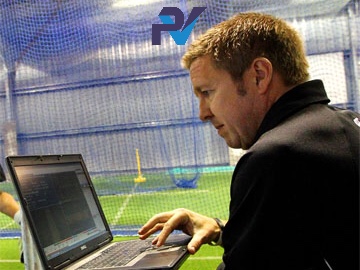How to Become a Cricket Analyst
 Cricket analysis has never been more important. Is it possible to make it a full time job?
Cricket analysis has never been more important. Is it possible to make it a full time job?
Yes. The salary is good and you get to be involved with cricket all day! Here’s a simple guide to becoming a cricket analyst.
You have probably seen analysts on TV, eyes glued to a laptop as the big game goes on in front of them. You may even know what they do; capture data like line and length, type of shot, and a dozen other things every ball.
No doubt you realise they spend time between Internationals analysing this data to find important information about their team and the opposition. It sounds like a brilliant job for a cricket-loving stats geek.
Is this image right?
The cricket analyst role
It’s certainly true that analysis requires a lot of time at a laptop. Most analysts in professional cricket do the following;
- Filming games with a digital camera and uploading data for review.
- Match coding: watching the game and entering on a laptop up to 10 different items for each ball from bowler through to batsman and fielder.
- Analysing team data at providing stats to the head coach, usually using tools like Excel for analysis and PowerPoint or Keynote for presentations.
- Analysing data from other teams to look for bowling plans and general scouting information
That’s the headline stuff, but a good analyst is more than a secretive character hiding behind a laptop. You also need coaching skills (ECB Level 2 equivalent at least) to allow you to do technical analysis alongside raw data. Plus, you will no doubt be used as an additional coach during training and warm ups. You need skills to throw and hit balls reliably for players who might be world-class standard.
Additionally, there are the “softer” skills of working with players and coaches. As analyst you will come across traditional resistance to your job. You need to both passionately believe in the power of analysis, whilst also being able to get along - and present data to - those who prefer to “eyeball”.
That’s a huge set of skills!
Progressing into analysis
There is no single path to becoming a cricket analyst.
Full-time jobs are mostly limited to professional cricket, so are hard to come by. For example in the UK, every County has an analyst but I know of only one club (non-professional) and one school to even use a part-time analyst.
There is no formal path to these jobs. Recent years have seen a growth in college and University courses to give qualifications in analysis. They are useful to learn the job, but not necessary. A degree is always a huge bonus, but it could easily be in a related subject like Sport Science.
Academia benefits aside, the most practical place to start to become an analyst is to become a volunteer coach, and work up by doing your own analysis.
There is always a need for volunteer coaches in cricket and the skills crossover is large. You can very easily establish an analysis programme with your team. All you need is a video camera and something to code games (paper, an iPad, a phone or a laptop will all do The job).
If you have access to PitchVision, you can do huge amounts of video and data analysis while coaching. At my club, this preseason has seen over 8000 balls In nets analysed with a senior squad of 24 players. None are professionals, but all are learning more about the way they play.
Throw yourself in to analysing, looking for trends in Excel, making technical pointers from videos and ways to present the information both verbally and via presentation tools like PowerPoint.
Once you can demonstrate that video and data is helping your players, you are in a stronger position to apply for a paid position At the professional level. Your club will be sorry to see you go!
The hardcore analysts
There is one other type of analysis that may suit you better: The hard data guys.
These are coders with knowledge of programming languages like Python. They understand complex maths and can generate predictive match models based purely on statistical data. There is not a cricket ball or tracksuit in sight.
The hard data analysts work for specialist companies who are contracted by professional teams to make predictions and spot trends. It means IPL teams can look far beyond averages when bidding on players and finding out highly specific skills that players have.
Most of us won’t even understand what exactly these guys do. They come from the world of maths and programming. If it doesn’t immediately appeal to you then stick to the more mainstream role. However, if you are a high level maths expert with no interest in coaching, seek out the companies that do this kinds of work. They will welcome you with open arms.
Summary
- Most analysts work in professional cricket and combine the role with some coaching.
- You need a wide range of skills from data and video analysis to people skills.
- There is no set pathway, but gaining experience through voluntary work is powerful.
- “Hard data” analyst roles also exist for high-level maths graduates.
- Login to post comments


Comments
Nicely explained...